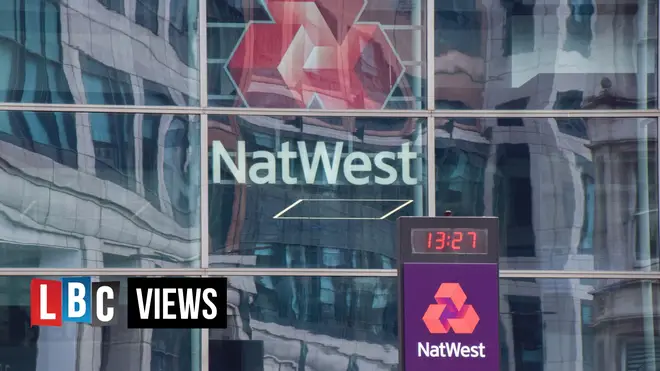
Rachel Johnson 6pm - 9pm
31 July 2023, 06:42 | Updated: 31 July 2023, 06:57

For a decade, the office of CEO at RBS/NatWest was a 'poisoned chalice.' Davies and Rose looked like the dream team – not so!
I suspect that Marcus Agius, John Varley, Bob Diamond, John Porter, and the other directors of Barclays will have been delighted to have dodged the ‘ABN Amro bullet’ in July 2008, allowing RBS’S Sir Tom Killop (Chairman), Fred Goodwin, Gordon Pell, Johnny Cameron and colleagues to scoop up its share of this Dutch bank’s investment banking division for an eye-watering $26 billion.
The other partners in this audacious acquisition were Santander and Fortis Bank. Little did they know that ABN Amro would turn out to be a vortex of toxic assets, many of which would be worthless once the full extent of the banking and credit crisis had been exposed globally. Prior to the deal, RBS had an ambitious £12 billion rights issue in April 2008.
Many felt that at time of the acquisition, RBS was sailing close to the wind with some of the European sector’s lowest capital ratios, more so even than its stretched UK peers.
RBS CEO Fred Goodwin and his deputy Gordon Fell plus Johnny Cameron, the director in charge of investment banking, aided and abetted by a hugely ambitious board of non-executive directors, which included Tom McKillop (Chairman), Lawrence Fish (Citizens Bank), Sir Steve Robson (HM Treasury), Joe McHale (JP Morgan), seemed ‘hell-bent’ on making this bank the biggest bank in the world, having started with the acquisition of NatWest Group in 2000. By October 2008, when ‘the writing on the wall’ this situation looked dire for RBS, turning it inevitably to insolvency, RBS balance sheet had grown to gargantuan levels, that it was barely within the capacity of the UK to save it.
It had assets of some £2.2 trillion. To give that context, the UK's entire GDP for that year was about £1.6 trillion. There was clearly reckless behaviour and perhaps a touch of greed, as RBS reached a pinnacle of such ludicrous and unsustainable size. Fred Goodwin understandably lost his knighthood.
However, he still has a reduced pension of £342,000 a year and his deputy, Gordon Pell is rumoured to be drawing £582,00 per annum. These perceived undeserved awards stuck in the public’s craw.

David Buik & Michael Wilson, two of the most respected commentators in the world of Money and Business come together for a weekly Global Player original podcast – Money!
In October 2008 RBS collapsed and was bailed out by the Government. At the outset the government owned as much as 84.4% of the bank after investing £45.5 billion in 2008 and 2009.
The administration of RBS was put into the hands, as it was with other ailing banks and building societies, of UK Financial Investments, which was initially marshalled by Sir John Kingman, a Treasury Mandarin, and a recently appointed director of Barclays, who handed over the reins to Sir Robin Budenberg in 2009.
Sir Robin is now chairman of Lloyds Banking Group.
In essence, the control of RBS unsurprisingly fell into the vice-like-control of the Government and UK Financial Investments. It is interesting to record that, having been slow out of the blocks, PM Gordon Brown had a ‘good banking crisis’, despite being at the helm of ‘soft regulation’ policies.
So did the then Chancellor Lord Alastair Darling and the late and much respected Lord Paul Myners. It goes without saying that Lord Mervyn King and Sir Paul Tucker at the Bank of England, who had warned that the banking sector was getting overheated, with unsustainable balance sheet sizes, gave an excellent account of themselves when stabilising very tense market liquidity conditions.
However, though hindsight is the greatest trader on earth, I think it was a mistake not to hive off the toxic assets into a bad bank and let RBS recover more quickly from its travails, with a clean balance sheet.
Consequently, RBS had to sell off decent assets including a 5% stake in Bank of China, Citizens Bank in the US, and Direct Line, as well as curtailing any prospect of a presence in major investment banking.
This course of action clearly stunted RBS’S recovery process. It was not to be and here we are fourteen years later, with the taxpayer still owning 38.6%, having regularly posted losses, as it struggled to reestablish itself, until 2022.

Being CEO of RBS or NatWest Group over the past fourteen years has proved to be ‘a poisoned chalice.’ In 2008 Stephen Hester was appointed as CEO.
He had great experience and success at Credit Suisse and Abbey National. He was a hard taskmaster. His colleagues always paid him a compliment that if he asked a technical question, he grasped the nettle immediately.
He never had to ask it again. However, he was very much his own man. He fell out with George Osborne, then the Chancellor over policy and resigned.
He could not be his own man, when the operation was controlled by the Government and UK Financial Investments. At the time Sir Philip Hampton was chairman of UK Financial Investments before being appointed Chairman of RBS.
Hampton and UKFS appointed Ross McEwan as CEO. Again, improving the quality of the balance sheet, whilst drowning in losses proved a task of Herculean proportions.
The appointment of Sir Howard Davies as Chairman in 2015 and Dame Alison Rose as CEO in 2019 looked like the ‘dream team.’ Sir Howard had access to the Government, Treasury, Civil Service and business and Dame Alison was a ‘lifer’ at NatWest (30 years).
The first initiative they took was to change the name to NatWest Group, which removed the RBS stigma.
Results started to improve, and the taxpayers’ holding was decreasing.
The show was back on the road, until the indiscreet conversation, which took place between Dame Alison and BBC’S Simon Jack, where there appears to have been an economy of the truth as to what happened to Nigel Farage and the termination of his account with Coutts, a subsidiary of NatWest.
It needed the Government and the Treasury to step in to facilitate her removal as CEO. Sir Howard should have immediately terminated her contract to maintain the credibility of the bank after the data protection act and client confidentiality had been breached.
Also, Coutts CEO Peter Flavel should have been summarily dismissed. Postponing the evil day showed a sign of management weakness to the public at large.
We await the appointment of the new CEO, post Paul Thwaite temporarily taking command.
Until then CEO of NatWest Group remains a ‘poisoned chalice!’